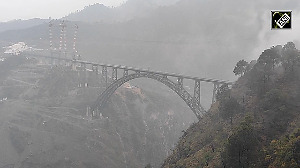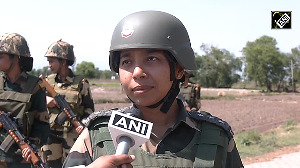Pakistan has moved 100,000 troops from its borders with India to bolster its campaign against the Taliban and other militants on its restive border with Afghanistan, the Pentagon said on Thursday.
The mass shifting of troops is an acknowledgement of the fact that terrorism and internal insurgency were posing more threat to Pakistan now, the Pentagon said in a report to the United States Congress.
"More than 100,000 Pakistani troops were moved from the eastern border with India. This unprecedented deployment and thinning of the lines against India indicates that Islamabad has acknowledged its domestic insurgent threat," the department said in its latest report on Afghanistan.
The Pentagon did not specify the regions from where the troops had been pulled out, but said it estimated that more than 140,000 Pakistani forces were now taking part in the ongoing offensive against the Taliban in Pakistan's semi-autonomous tribal region, the Federally Administered Tribal Area.
The Pentagon report was issued hours before the crucial meeting between Prime Minister Manmohan Singh and his Pakistani counterpart Yusuf Raza Gilani in the Bhutanese capital Thimphu on the sidelines of the South Asian Association for Regional Cooperation Summit.
The US Defence Department, while acknowledging that Pakistani military operations in tribal areas of the North West Frontier Province had placed 'a high degree of pressure on militants and reduced their safe havens', added that it was unlikely to have an immediate impact on the US-led war in Afghanistan.
The Pentagon report said that there was a broad syndicate of extremist groups operating in the Af-Pak region with multiple short and long-term goals.
It identified the groups as Al Qaeda, Tehreek-e-Taliban and Lashkar-e Tayiba, which threatened the security of Afghanistan, Pakistan, India and other nations.
"The three major groups include the Quetta Shura Taliban, Hezb-e-Islami Gulbuddin and the Haqqani Network. These groups cooperate and coordinate at times and their areas of operations tend to be geographically and demographically determined," it said.
"They operate mainly in the Pashtun-majority areas of Afghanistan in the south and east, and in Pashtun pockets in the north. The common goals of these groups are to expel foreign forces from Afghanistan (although there is no mention of foreign fighters allied with them or Al Qaeda) and to undermine the central government," the report added.
Pentagon said Pakistan military crackdown so far has focused only on internal threats, but outlined that these could be more productive, depending on how they evolve in future.
It acknowledged that the Pakistan military had suffered attacks from terrorists in response to its successful operations.
"These attacks include mass casualty events in Mingora, South Waziristan Agency -- close to clearing operations -- as well as in Lahore, far away from the fighting. While these attacks do not appear to have shaken Pakistan's commitment, they do demonstrate, for the time being, insurgent ability to continue attacks despite reported successful operations by the Pakistan military," said the report.
According to the report, the Pakistan army is beginning to acknowledge the ties and threats posed by Afghan and Pakistani Taliban.
"The Pakistani operations have focused almost exclusively on internal threats. These operations reduce the space available to all insurgent and extremist groups," it said.
Despite discussions regarding the possibility of the transfer of Afghan Taliban militants captured in Pakistan to Afghanistan, most notably Mullah Abdul Ghani Baradar, no transfers have taken place, it said.
The Pakistan military has also offered to provide training to Afghanistan army and security personnel. The Afghan ministry of defence is reviewing the offer, but is evaluating it cautiously based, on the Afghan government's political concerns, the report said.





